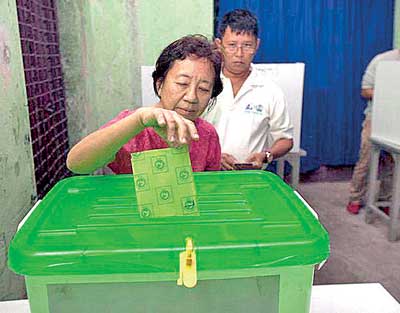22 Mar 2016 - {{hitsCtrl.values.hits}}
By Sorpong Peou
In recent years, Southeast Asia has experienced what are, if viewed in historical perspective, three ‘miracles’: economic growth, the disappearance of mass atrocities, and efforts to promote regional peace and community building.

Most noteworthy is the fact that the mass atrocities seen in decades past — like those in Indonesia (1965–66), Cambodia under the Khmer Rouge (1975–1978), and East Timor during the Indonesian occupation (1975–1999) — have all disappeared from contemporary Southeast Asia. With the human rights declaration adopted unanimously in 2012, ASEAN leaders sought to appear united in their belief that human rights and democracy are now common engines of progress.
But authoritarianism keeps threatening to return. Below the surface of official declarations lies an acceptance among most ASEAN leaders that democracy and human rights should not be pushed too fast and too far. The past few years saw some serious setbacks in this area, as political elites have tightened control over opposition parties and civil liberties. Malaysia and Indonesia, for instance, have been accused of human rights violations, such as restricting civil liberties and abusing minority rights. What explains this negative and worrisome trend?
Political history and culture
Political history and culture are regarded as factors that impede each country’s march to democracy. Western-style liberal ideas made inroads into the region after colonial rule ended, but have struggled to take root in a region where authoritarianism has left a deep legacy. Daniel Bell, for instance, regards the Asian mindset as ‘anti-freedom’. In this view, Asians see the ‘iron cage’ as source of security, not as a prison.
Ideological authoritarianism is another factor. As socialist states, Laos and Vietnam are still run by communist parties whose leaders have no desire to abandon political authoritarianism, despite their embrace of capitalism on the economic front. Their track records on democratic reform remain dismal.
Economic development offers existing authoritarian regimes additional means to disarm dissent by using newly accumulated wealth to legitimise their tight grip on power. Singapore and Malaysia have been cited as examples of how democratisation has been kept at bay despite economic
modernisation. Singapore’s hegemonic-party system has been entrenched since the 2015 elections.
All these factors help make some sense of authoritarian persistence or democratic roll-back, but none can fully explain why democracy seems to have a hard time putting down deep roots in the region. Another key factor is the weak institutional basis that Southeast Asian democracies have been built on.
Democratic transitions
Many Southeast Asian countries have in the past experienced democratic transitions, including the Philippines in 1986, Cambodia and Thailand in the early 1990s, and Indonesia in 1998. Yet none of these countries has successfully entrenched democracy and democratic values. Elections have been held, some freer and fairer than others. But below the shallow democratic structures built for electoral competition lie awfully weak institutional foundations.
First and foremost among these institutional failings is that in most ASEAN countries the armed forces remain a significant political player. Thailand is the best example of an ASEAN country where the military has never really bowed to civilian rule. Rather it has staged several coups that have ousted an elected government, most recently in 2014. Yet even in more democratic states like Indonesia and the Philippines, the armed forces still have considerable influence over national politics and have been accused of human rights violations.
The role of armed forces in Southeast Asia, and their involvement in national politics, will be key to determining the direction of political regimes in the region. The invocation of military threats from other countries and the subsequent need for substantial defence spending, political economies of corruption, as well the perceived threat of domestic insurgencies or instability all help sustain the power of military elites in Southeast Asia. In Myanmar, for example, the military seems determined to maintain a political role at least until it is satisfied that a lasting peace with the country’s various armed ethnic groups has been reached and it is confident that its members will not be subject to prosecution.
The importance of securing military support for ensuring national, regime and elite security could further help explain why the most difficult time for democracy in Southeast Asian history was during the Cold War, and why democracy found its way back to the region once the Cold War was over. Cambodia was among the first to become democratic when the UN intervened by helping to turn the battlefield into a ballot box. When the Suharto regime fell in 1998, beginning Indonesia’s democratisation process, over one-third of ASEAN’s total population became citizens of a democracy. Timor-Leste also became a democracy when it achieved independence from Indonesia, with the help of international intervention, at the turn of the 21st century.
Geopolitics
Progress on the democracy front may once again come under threat from geopolitics. The rise of China, escalating tensions in the East and South China Seas, ongoing military build-ups in the region, as well as international terrorism and crackdowns on various forms of domestic insurgency all present challenges to democracy and human rights.
It should come as no surprise if security elites in Southeast Asia assert that it is too early to relegate their traditional role in ‘national defense’ to the dustbin of history in such an insecure environment.
(Courtesy East Asia Forum)
(Sorpong Peou is Professor and Chair at the Department of Politics and Public Administration, Ryerson University)
24 Nov 2024 4 hours ago
24 Nov 2024 7 hours ago
24 Nov 2024 8 hours ago
24 Nov 2024 8 hours ago